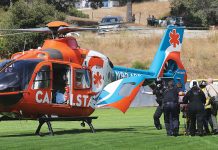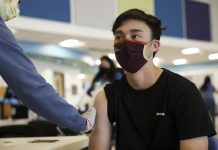(Aaron Newsom, co-founder and chief operations officer of Santa Cruz Veterans Alliance, inspects a marijuana crop at the company’s indoor growing operation in Watsonville. Photo by Tarmo Hannula/Pajaronian)
WATSONVILLE — Watsonville’s first permitted marijuana growing facility is Santa Cruz Veterans Alliance, which currently distributes its products to dispensaries throughout the Bay Area, and its own in Santa Cruz.
If Watsonville allows marijuana dispensaries when the city council takes up the issue next year, the organization will also sell from its 274 Kearney St. location.
But retail sales are secondary to the group’s primary mission: providing free, high-quality medicinal marijuana to veterans and hopefully free them from dependence on opioids.
Santa Cruz Veterans Alliance was founded in 2011 by military veterans Aaron Newsom and Jason Sweatt, both of whom were growing their own cannabis to replace or supplement prescription painkiller drugs.
That was the crux of their problem, and they are not alone.
According to a 2014 report by the U.S. Department of Veterans Affairs, more than 50 percent of veterans suffer from chronic pain. In 2014, the VA reported that it issued 1.3 million prescriptions to veterans for opioids such as hydrocodone, oxycodone, methadone and morphine.
Experts say that people who build addictions to such legal painkillers often turn to illegal ones such as heroin when their prescriptions run out.
“We realized there was a whole community of veterans that could benefit from this medicine, and we decided to make it our mission,” Newsom said. “There is a safer alternative, and we’re going to continue to fight for that.”
•••
Personal stories
SCVA VP of Communications and Public Affairs Seth Smith said he was in graduate school in Princeton University when his mother got sick and needed a kidney transplant.
He was a match, and in the wake of the surgery he was in the hospital for about four days.

(Seth Smith is vice president of communications and public affairs. Photo by Tarmo Hannula/Pajaronian)
“That was the first time I needed painkillers for an extended period of time,” he said. “And I immediately understood what the issues were. Because I did not like the way they made me feel.”
Doctors prescribed painkillers upon his release from the hospital, but Smith said he threw them away.
That was because his family brought him several different types of cannabis products. These, he said, worked better than any of the pharmaceuticals ever could.
Smith said he met the founders and soon found a career path in SCVA and the Veteran Compassion Program.
“It was one of those moments where you’re not really sure what you’re looking at, but you know you’re looking at something special,” Smith said.
Newsom, a Santa Cruz native, served in Afghanistan with the U.S. Marine Corps.
His return was difficult, however. He said he suffered from hyper-vigilance and insomnia, and found it difficult to feel safe.
“I had a real tough time reintegrating and finding work,” he said.
Doctors prescribed a “gamut” of pharmaceuticals, which he found unhelpful.
“They stunned me down a hole even more,” he said.
When Newsom found success with cannabis, he decided to try farming his own.
He used the GI Bill to earn his degree in organic farming from Cabrillo College.
•••
Veteran Compassion Program
At the heart of SC Veterans Alliance’s program is its Veteran Compassion Program, which was created from a sad truth about veterans: only about 44 percent of them are enrolled with the Department of Veterans Affairs. The ones who aren’t are missing out on programs and services that could benefit them, Smith said.
Organizers wanted a way to get vital information to veterans who have flown under the radar.
“There’s this huge group of guys they can’t get to, because they never come to the other meetings,” Newsom said.
Such a connection, and the camaraderie that naturally comes from it, is important at a time when an estimated 22 veterans commit suicide every day, Newsom said.
“Just making that one difference, can be that difference in saving a life, or getting a life back on track before it goes too far off the road,” he said.
SC Veterans Alliance began by holding meetings in Kind Peoples, a dispensary in Santa Cruz.
Within two months they outgrew that facility and started holding meetings in the VFW hall on 7th Avenue in Santa Cruz. From there they moved to the Santa Cruz/Live Oak Grange.
Some 150 veterans now attend the monthly meetings, where they cash in vouchers for free bags of marijuana. All of that is funded by retail sales.
As such, the monthly meetings have shifted to being more about camaraderie and sharing experiences, Newsom said.
The group also hopes to eventually hold Veteran Compassion Program meetings at the Watsonville location.
•••
Multiple benefits
Among SC Veterans Alliance’s clients are six WWII veterans, several from the Vietnam and Korean wars and the more recent conflicts in the Middle East.
These people suffer from a variety of afflictions such as Post Traumatic Stress Disorder, chronic pain, repetitive motion injuries and wounds, just to name a few.
“Cannabis helps with all those things,” Smith said.
Another part of their mission is reducing the stigma surrounding the marijuana industry, Smith said.
“We’re trying to combat that by putting our best foot forward and being as transparent as possible,” he said.
Advocates say that cannabis is not just for smoking, and certainly not only for getting “high.”
It can be incorporated into salves, topical creams and gel caps.
One compound found in cannabis is tetrahydrocannabinol (THC), which is responsible for the “high” that comes from using marijuana. But it also is an effective painkiller.
Another compound is Cannabidiol (CBD), which does not produce a high and is thought to offer a wide range of benefits.
A 2014 study published in the Journal of Biological Chemistry indicated that CBD has slowed or stopped tumors in mice.
A separate study from that same year in the journal Molecular Cancer Therapeutics showed that CBD helped with the treatment of Glioma, one of the most aggressive and hardest to treat cancers.
Using marijuana products has been known to help patients with chronic pain, muscle spasms, seizures and epilepsy.
•••
The building
Originally a cold storage business, the building on 274 Kearney St. holds six separate 960-square-foot rooms, each with several rows of plants. All of these bask in the glow of several grow lights.
The operation is driven by a hydroponic system that pumps nutrient-rich water through their roots.

(Sean Dyer waters rows of marijuana plants in a grow room. Photo by Tarmo Hannula/Pajaronian)
The business is permitted for 5,000 square feet, and Newsom hopes one day to add a second level to the indoor operation.
Much of what was growing during a visit in late March was a strain known as Kosher Kush, renowned for its ability to induce sleep.
“People drive from all over the state for this,” Smith said.
Watsonville has issued six permits to grow, process and distribute marijuana in the city. SC Veterans Alliance is the only one currently operating fully.
Watsonville Community Development Director Suzi Merriam said the city is not likely to consider allowing dispensaries this year.
The Watsonville City Council must first approve updating its marijuana ordinance to allow testing of the marijuana products, Merriam said.
No matter what the city decides to do with dispensaries, Newsom said that the organization will continue to provide safe access of medicinal cannabis to veterans.
“We really mean that,” he said. “We’re not just growing it and using that as a guise. That was our mission, and then this became.”
•••
For information, visit scveteransalliance.com.











